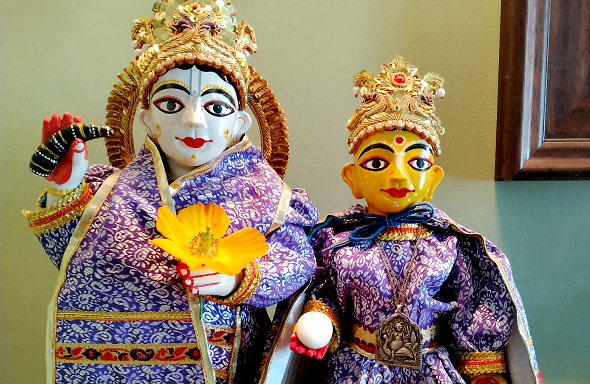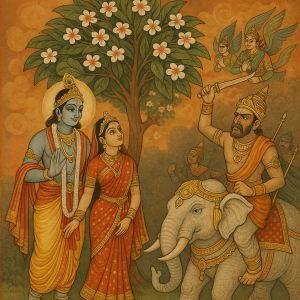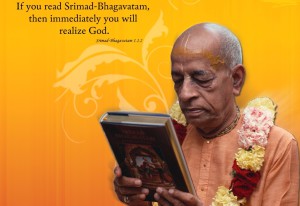Revatī is the daughter of King Kakudmī and the consort of Balarāma, the elder brother of Śrī Kṛṣṇa. Kakudmī, also known as Raivata (meaning “son of Revata”), was the king of Kuśasthalī. The account of Revatī’s marriage to Balarāma is described in the Ninth Canto of Śrīmad-Bhāgavatam.
The Search for a Suitable Husband
Kakudmī, concerned about finding a suitable husband for his beautiful daughter Revatī, decided to seek advice from Lord Brahmā. He took Revatī to Brahmaloka, the abode of Lord Brahmā, which is beyond the three modes of material nature.
When they arrived, Brahmā was listening to a musical performance by the gandharvas, so they patiently waited for him to finish. After the performance, Kakudmī humbly presented his request, along with a shortlist of potential suitors. However, Brahmā laughed and explained that during the short time they had waited in Brahmaloka, 27 chatur-yugas (a cycle of the four yugas: Satya, Treta, Dwapara, and Kali) had passed on Earth—equivalent to 116,640,000 human years. Consequently, all the suitors Kakudmī had considered had long since died, along with their descendants.
The Advice of Lord Brahmā
Brahmā advised Kakudmī to offer Revatī’s hand in marriage to Balarāma, who was still present on Earth. Balarāma, being an incarnation of the Supreme Personality of Godhead, was a perfect match for Revatī. Brahmā assured Kakudmī that Balarāma would be an ideal husband for her.
The Return to Earth
When Kakudmī and Revatī returned to Earth, they were astonished by the changes that had occurred during their brief visit to Brahmaloka. The world they knew had transformed entirely—people had become shorter, less energetic, and less intelligent due to the transition into the Kali Yuga. The once magnificent capital of Kuśasthalī had been renamed Dvārakā.
The Marriage of Balarāma and Revatī
Upon their return, Kakudmī approached Balarāma with the proposal of marriage to his daughter. Knowing Revatī to be his eternal consort, Balarāma gladly accepted. Since Revatī was from a previous yuga, she was much taller and larger than the people of Balarāma’s age. However, with a gentle tap of his plough (his characteristic weapon) on her shoulder, Balarāma reduced her size to match that of people in his time.
The marriage was celebrated with great jubilation and transcendental bliss. The streets were adorned with flower garlands, and sandalwood-scented water was sprinkled along the pathways. Auspicious items such as water pots, banana trees, grains, and fruits were placed outside every home. The people dressed in beautiful attire and adorned themselves with precious ornaments to witness the grand wedding.
Amidst the chanting of Vedic hymns and musical presentations, Balarāma accepted Revatī as his wife, bringing immense joy to everyone present. King Kakudmī, having fulfilled his duty as a father, was completely satisfied and later retired to Badarikāśrama to engage in spiritual practices.
Lessons to Be Learned from the Story of Baladeva’s Marriage with Revatī
- The Relativity of Time:
- The story illustrates the concept of time being relative, especially when Kakudmī and Revatī experience the passage of millions of years on Earth while spending only a short time in Brahmaloka. This teaches us that time and its effects vary across different planes of existence and that we should remain conscious of the transient nature of life.
- Divine Guidance and Faith:
- Kakudmī’s decision to seek the counsel of Lord Brahmā shows the importance of divine guidance when making significant life decisions. The advice to offer Revatī’s hand to Balarāma, the Supreme Personality of Godhead, emphasizes the value of placing trust in divine wisdom.
- The Inevitable Changes in the Material World:
- Upon returning to Earth, Kakudmī and Revatī find that everything has changed, including the physical and intellectual characteristics of humans. This highlights the inevitable nature of change in the material world, reminding us to adapt and accept transformations that occur over time.
- Acceptance of Destiny:
- The story conveys the importance of accepting one’s destiny with grace. Despite the drastic changes, Kakudmī dutifully fulfills his responsibility by offering his daughter to Balarāma, showing that one should embrace their role in the divine plan.
- Spiritual Transformation:
- Balarāma’s act of adjusting Revatī’s height to match the people of his time symbolizes the transformative power of divine intervention. It teaches us that spiritual advancement often requires transformation, both internal and external, to align with higher truths.
Prayer for Guidance and Acceptance
O Supreme Personality of Godhead, Balarāma, Who holds the plough as Your emblem of strength and support, I bow before You in reverence.
As You guided King Kakudmī to fulfill his duty, Guide us, too, in our endeavors, To make decisions that are aligned with Your divine will.
O Lord, grant us the wisdom to seek Your counsel, As King Kakudmī sought the guidance of Lord Brahmā, And the faith to trust in Your divine plan, Even when the path ahead seems uncertain.
Lord Balarāma, just as You transformed Revatī with a gentle touch, Transform our hearts and minds, So that we may rise above the changes of this material world, And align ourselves with the eternal truths.
May we, like King Kakudmī, accept our destiny with grace, And fulfill our duties with a heart full of devotion.
O merciful Lord, let Your divine presence fill our lives, Bringing us closer to You, And guiding us towards spiritual elevation and eternal peace.
Hare Krishna, Hare Krishna, Krishna Krishna, Hare Hare, Hare Rama, Hare Rama, Rama Rama, Hare Hare.


